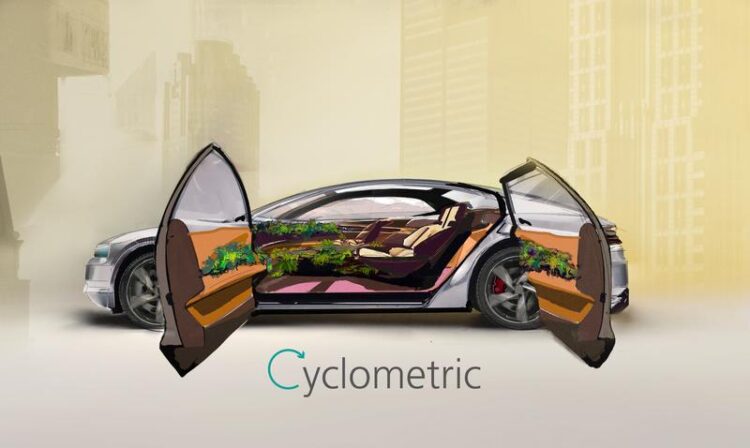Circular economy in the automotive industry

Sustainable car of the future: The CYCLOMETRIC tool is designed to ensure that all components are recyclable even during development
Credit: Fraunhofer IAO
Tool supports the development of recyclable components.
Components in automobiles must no longer only meet the highest technological standards, but must also be sustainable and recyclable. In the future, engineers will not only have to keep an eye on the finished product during development, but also on the end of its life cycle. Since humans prefer to think in linear terms rather than in cycles, artificial intelligence will help them to do this. In the CYCLOMETRIC project, a tool is being developed that already makes suggestions for improvement during product planning.
The German Institutes for Textile and Fiber Research Denkendorf (DITF) is one of the project partners in the research project, which is funded by the German Federal Ministry of Education and Research (BMBF) and supervised by the Project Management Agency Karlsruhe (PTKA).
Recycling of high-performance materials often fails because the materials cannot be separated into their original components. CYCLOMETRIC aims to ensure that this problem does not have to be solved at the end of a product’s life cycle. With current methods and tools, environmental impacts are often not examined until near the end of development or even after production has begun – even though the most relevant decisions about product properties are made much earlier. The new system helps to make the right decisions during development. To this end, data, information and knowledge are analyzed and evaluated across all development phases and interfaces. Research approaches from advanced systems engineering and model-based systems engineering are used in conjunction with life cycle assessment methods and business model analysis.
Product developers juggle complex parameters such as producibility, recyclability, reusability, CO2 emissions and costs on a daily basis. Last but not least, the expectations and habits of customers have to be taken into account. Whether selecting materials or planning production steps, the tool calculates the impact and makes suggestions for improvement.
In the CYCOMETRIC project, a center console trim serves as an application example for the digital tool. It is made of sustainable textile materials and has smart functions integrated into the textile. Nevertheless, the finished tool is not limited to the automotive industry. It can be used in all industrial fields.
The DITF’s task is to select and test suitable materials. The team develops the appropriate manufacturing and processing procedures and creates a prototype. Test runs on the functional, everyday-, long-term and extreme suitability of the textile structures and fiber composites are carried out at the test laboratories, which can be reproduced in subsequent applications. Concepts for sensors and actuators are being developed for the smart functions of the console.
As a partner in the ARENA2036 research campus, the DITF bring extensive experience in lightweight construction through function integration in automobiles. After completion of the project, the Denkendorf researchers will advise companies on how textiles can be increasingly used in vehicle interiors.
Project Partners:
• Fraunhofer-Institute für Arbeitswirtschaft und Organisation IAO sowie für Bauphysik IBP
• Institut für Arbeitswissenschaft und Technologiemanagement IAT, Institut für Flugzeugbau IFB sowie Institut für Akustik und Bauphysik IABP der Universität Stuttgart
• Deutsche Institute für Textil- und Faserforschung Denkendorf (DITF)
• ESB Business School der Hochschule Reutlingen
• Schweizer Design Consulting GmbH
• Forward Engineering GmbH
• IILS Ingenieurgesellschaft für Intelligente Lösungen und Systeme mbH
• DXC Technology Deutschland GmbH
• Lotus Tech Innovation Centre GmbH
• Associating partner: ARENA2036 e.V.
Wissenschaftliche Ansprechpartner:
Dr. rer. nat. Michael Haupt
Head of Technology Center E-Textiles & Acoustics
T +49 (0)711 93 40-279
E michael.haupt@ditf.de
Media Contact
All latest news from the category: Automotive Engineering
Automotive Engineering highlights issues related to automobile manufacturing – including vehicle parts and accessories – and the environmental impact and safety of automotive products, production facilities and manufacturing processes.
innovations-report offers stimulating reports and articles on a variety of topics ranging from automobile fuel cells, hybrid technologies, energy saving vehicles and carbon particle filters to engine and brake technologies, driving safety and assistance systems.
Newest articles

Largest magnetic anisotropy of a molecule measured at BESSY II
At the Berlin synchrotron radiation source BESSY II, the largest magnetic anisotropy of a single molecule ever measured experimentally has been determined. The larger this anisotropy is, the better a…

Breaking boundaries: Researchers isolate quantum coherence in classical light systems
LSU quantum researchers uncover hidden quantum behaviors within classical light, which could make quantum technologies robust. Understanding the boundary between classical and quantum physics has long been a central question…

MRI-first strategy for prostate cancer detection proves to be safe
Active monitoring is a sufficiently safe option when prostate MRI findings are negative. There are several strategies for the early detection of prostate cancer. The first step is often a…



